Between the USA and China: Why has Myanmar become a field of competition for the powers?
Nine months ago, opposition leaders led by Aung San Suu Kyi came to power in Myanmar. Woman politics in the West was considered the embodiment of Burmese democracy. But already the first months of the rule of Aung San Suu Kyi as prime minister of Myanmar showed that she understands democracy somewhat differently. Thus, Aung San Suu Kyi did not abandon the repressive policy towards the Rohingya - the Burmese Muslims who were still persecuted by the military regime of Myanmar. Although the West constantly urges Myanmar to respect human rights with respect to Rohingya, Yangon is in no hurry to make concessions to the world community.
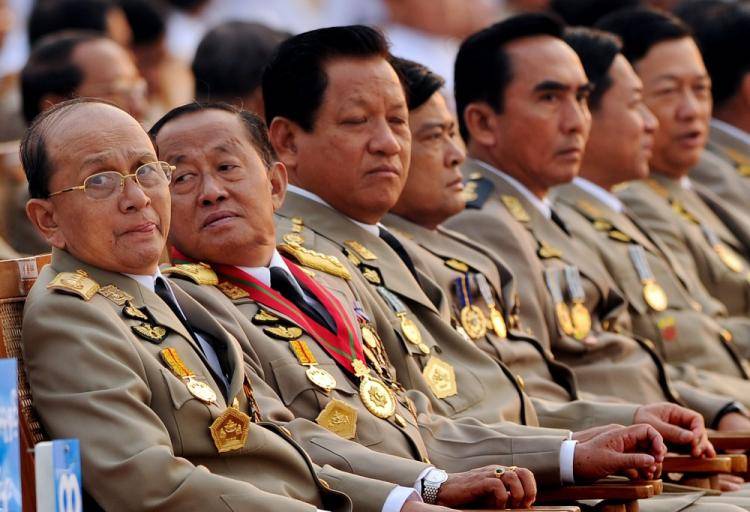
For a long time, the West has had many complaints against Myanmar. This state was considered one of the toughest dictatorships. In the first place - because of its closeness. The military regimes that ruled the country since 1962 for a very long time have hampered the development of contacts with the outside world. This was facilitated by the national ideology of the Party of the Burmese socialist program - a kind of analogue of national socialism, focused on "self-reliance" and the protection of national traditions and way of life. Secondly, in a number of Myanmar states, there has been an ongoing civil war since the end of the 1940s. This is the real “war of all against all”: separatists are fighting against government forces and against each other, communists against government forces and separatists, government forces against communists and separatists. In Myanmar, there are several dozen ethnic groups, and many of them claim to create autonomies, and even independent states. China is clearly behind the backs of certain nationalist groups of Burmese ethnic minorities. At the same time, China has long cooperated with the Burmese regime itself, and the relations between the two states have especially strengthened recently. In fact, this is exactly what the West did not like.
For China, Myanmar is of strategic interest. Cooperation with the government of Myanmar has given China many advantages. First of all, a communication infrastructure was built across Myanmar, allowing China to gain access to the coast of the Indian Ocean. For example, through Myanmar from 2013, the transit of Middle Eastern natural gas to China is carried out. For China, the supply of Middle Eastern energy resources is of particular importance. It is not only about gas, but also about oil. By the way, oil is supplied to China from the Middle East also via Myanmar - two years ago, on January 30 and 2015, China built a large oil terminal in Myanmar. In exchange for the transit of energy resources through the territory of Myanmar, China guaranteed non-interference in the internal affairs of this country. Beijing has never reproached Yangon for violating human rights, although stories Burmese-China relations have "dark spots". What is the alleged support for the State of Wa - a political entity in the state of Shan, created by the national movement of the Ba people and focused on China? American analysts have argued that it is China that remains the main supplier of weapons to the Wa State.
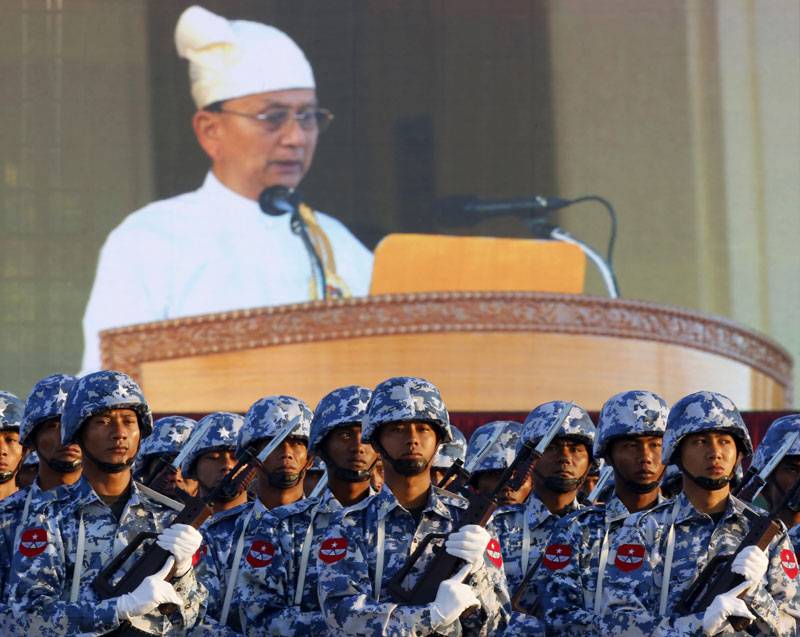
The development of economic relations with Myanmar is very interested in China, since the same way of transporting energy through Myanmar seems to be the cheapest and safest. This is especially important in the conditions of further destabilization of the situation in the Middle East. In addition, through a transport corridor through Myanmar, China expects to accelerate the economic modernization of its internal provinces. Such provinces of China as Sichuan or Yunnan, which do not have access to the sea, thanks to the Burmese Corridor, receive additional opportunities to improve their economic position and accelerate their development. This is well understood in Beijing, and therefore strive to maintain an acceptable relationship with Yangon. Of course, for a long time, China was completely satisfied with Myanmar’s secrecy for the West, since it made it possible to reduce the likelihood of penetration of Burmese markets for Western products. In Beijing, they had nothing against the military regime, with which China even had a certain ideological affinity.
However, recently the situation in Southeast Asia began to change rapidly. First of all, these changes were connected with the policy of the United States, which sought to beat its most important economic and political rival - China. It is from the point of view of the weakening of the Chinese positions in Southeast Asia that the increased US attention to the political situation in Myanmar is connected.
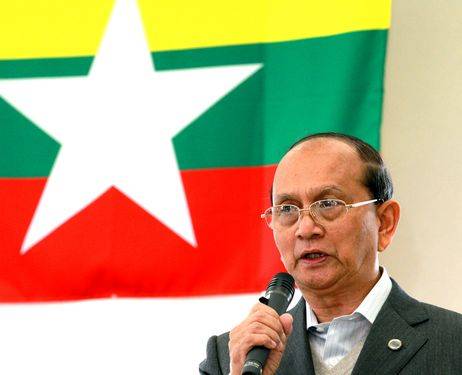 It was decided in a rather trivial way to weaken Chinese influence in Myanmar in Washington. The Burmese military junta was promised to gradually remove the international isolation of Myanmar and, at the same time, reduce the country's dependence on Chinese influence. In response, the military regime went to a significant liberalization of the political climate in the country. In 2011, the Myanmar parliament elected a new president. They became Thein Sein (pictured), in 2007-2011. who served as prime minister of the country. Before the world community, Thein Sein appeared as a civilian politician — to retain support for the West, he even retired from military service, where he rose to the rank of army general. Although in the recent past, Thein Sein was one of the immediate leaders of the military junta, the West welcomed him as the new head of state. As president of the country, Thein Sein was five years old - from 2011 to 2016. During this time, the US policy towards Myanmar has shown a shift towards complete benevolence. In 2012 and 2014 Myanmar was visited by US President Barack Obama. This was evidence of a cardinal change in relations between the two states. The price paid for location by Washington from the side of Myanmar was the refusal of China in a number of important projects planned by Beijing. In particular, Thein Sein refused to allow the construction of a railway from the Rakhine State of Bengal Bay to the Chinese province of Yunnan. If built, this railway would play a very important role in the delivery of goods to China delivered to the ports of Rakhine from the countries of the Middle East. Myanmar itself could have benefited greatly from the operation of the railway, so the fact that the government denied Beijing the satisfaction of this project was evidence of Myanmar’s desire to get relief from the West, primarily to achieve the lifting of economic sanctions. However, there was no final rupture of relations with China. Moreover, the trade turnover between China and Myanmar continues to grow. Tendencies to the further development of economic cooperation between the two states continued throughout the term of Thein Sein.
It was decided in a rather trivial way to weaken Chinese influence in Myanmar in Washington. The Burmese military junta was promised to gradually remove the international isolation of Myanmar and, at the same time, reduce the country's dependence on Chinese influence. In response, the military regime went to a significant liberalization of the political climate in the country. In 2011, the Myanmar parliament elected a new president. They became Thein Sein (pictured), in 2007-2011. who served as prime minister of the country. Before the world community, Thein Sein appeared as a civilian politician — to retain support for the West, he even retired from military service, where he rose to the rank of army general. Although in the recent past, Thein Sein was one of the immediate leaders of the military junta, the West welcomed him as the new head of state. As president of the country, Thein Sein was five years old - from 2011 to 2016. During this time, the US policy towards Myanmar has shown a shift towards complete benevolence. In 2012 and 2014 Myanmar was visited by US President Barack Obama. This was evidence of a cardinal change in relations between the two states. The price paid for location by Washington from the side of Myanmar was the refusal of China in a number of important projects planned by Beijing. In particular, Thein Sein refused to allow the construction of a railway from the Rakhine State of Bengal Bay to the Chinese province of Yunnan. If built, this railway would play a very important role in the delivery of goods to China delivered to the ports of Rakhine from the countries of the Middle East. Myanmar itself could have benefited greatly from the operation of the railway, so the fact that the government denied Beijing the satisfaction of this project was evidence of Myanmar’s desire to get relief from the West, primarily to achieve the lifting of economic sanctions. However, there was no final rupture of relations with China. Moreover, the trade turnover between China and Myanmar continues to grow. Tendencies to the further development of economic cooperation between the two states continued throughout the term of Thein Sein. 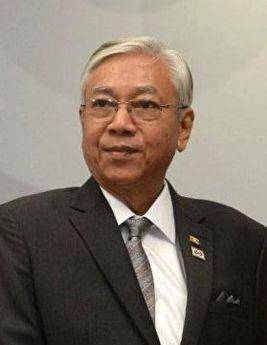
In March 2016, Thin Kyaw was elected president of Myanmar (pictured). The 70-year-old politician became the first in fifty-four years the leader of the Burmese state, unrelated to the armed forces. Coming from the intellectual family of the writer Min Tu Woon, T'hin Chоo was educated at the Rangoon Economic Institute, worked for a long time as a programmer and system analyst, and worked at the Ministry of Industry as Deputy Head of the Department of International Economic Relations. He is a member of the National League for Democracy - until recently, the main opposition party in the country, which has now come to power. The party is now headed by Myanmar’s Prime Minister Aung San Suu Kyi, the daughter of the legendary fighter for the independence of Burma and the creator of the Burmese army, General Aung San (1915-1947).
Aung San Suu Kyi has long been considered in the West one of the most liberal and pro-Western Burmese politicians. She lived in the United States for a long time, working in UN structures. In 1972, Aung San Suu Kyi married British tibetologist Michael Aires (1946-1999). Back in 1985, Aung San Suu Kyi herself received a doctorate in philosophy from the School of Oriental and African Studies at the University of London. All these circumstances contributed to strengthening its image as a "face of Burmese democracy." On Aung San Suu Kyi West had very high hopes. Returning to Myanmar, Aung San Suu Kyi created the National League for Democracy and engaged in opposition activities. In 1989, she was put under house arrest.
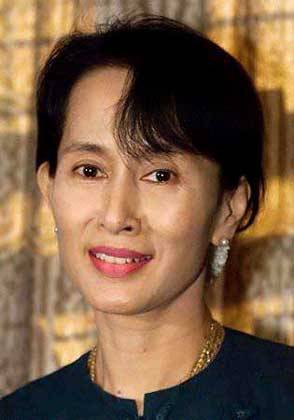 The regime did not dare deal with Aung San Suu Kyi for two main reasons. First, the woman politician was the daughter of Aung San himself - one of the most important national heroes of Burma, the “icon” of the Burmese military regime. Secondly, at the time of the house arrest, Aung San Suu Kyi was already very famous worldwide. The country's authorities were even willing to go for her release if Aung San Suu Kyi agreed to leave Myanmar, but she refused. In 1991, Aung San Suu Kyi received the Nobel Peace Prize, which automatically placed her in the first row of politicians - "fighters for democracy."
The regime did not dare deal with Aung San Suu Kyi for two main reasons. First, the woman politician was the daughter of Aung San himself - one of the most important national heroes of Burma, the “icon” of the Burmese military regime. Secondly, at the time of the house arrest, Aung San Suu Kyi was already very famous worldwide. The country's authorities were even willing to go for her release if Aung San Suu Kyi agreed to leave Myanmar, but she refused. In 1991, Aung San Suu Kyi received the Nobel Peace Prize, which automatically placed her in the first row of politicians - "fighters for democracy." 13 November 2010, Aung San Suu Kyi was released from house arrest. Her release was one of the first signs of political liberalization in Myanmar. In November, the authorities went further 2011 - they allowed the opposition National League for Democracy to participate in parliamentary elections. 8 November 2015, the National League for Democracy won the country’s parliamentary elections, which the authorities announced on November 13. However, Aung San Suu Kyi was unable to become the president of Myanmar. The fact is that according to the country's constitution, the spouse of a foreign citizen (at the time of election Aung San Suu Kyi was already a widow - Michael Eiris died in 1999) and the mother of two foreign citizens (her sons have foreign citizenship) cannot be the President of Myanmar. Therefore, Thinh Chou was approved by the President of the country in March 2016, and Aung San Suu Kyi assumed the post of State Counselor of Myanmar, which functionally corresponds to the post of Prime Minister in other states. The coming to power of the National League for Democracy was enthusiastically received by the West, who saw in this event the victory of democracy and, accordingly, the weakening of China's economic and political influence in the country.
However, the woman - the Nobel laureate disappointed the American and British patrons. China became the first country outside ASEAN, where Aung San Suu Kyi went on an official visit as a state adviser to Myanmar. 17-21 August 2016 she visited the People's Republic of China, where she met with top leaders of the Chinese state. The first visit is a symbolic event, and the fact that Aung San Suu Kyi chose China, and not the United States, as the goal of her first visit, says a lot. First, it shows that the new leadership of Myanmar is not going to refuse to cooperate with China, the country's most important economic partner. Chinese investment accounts for more than a quarter of total foreign investment in the Myanmar economy. Myanmar simply cannot afford to lose such a partner. China, in turn, is counting on the resumption of the Myitsson dam project, which is very interesting for itself.
Secondly, China can play a decisive role in the normalization of the military-political situation in the northern states of Myanmar. As we said above, many armed groups of ethnic minorities in the northern states operate with ill-concealed support from China. Working with these groups gives China great leverage over the government of Myanmar. If Myanmar pursues a policy that satisfies Chinese interests, then Beijing can reduce support for armed rebel forces. If Myanmar chooses to cooperate with Washington and London, then Beijing can increase its support for the rebels, and then the situation in the northern states of the country will become hot again. The US is far away, and China is close, and the rebels, especially, control the border areas with China. That is, the rebel groups have the ability to receive military assistance directly from China, and government troops practically can not prevent them from doing so. By the way, when the previous leadership of Myanmar led by Thein Sein began to demonstrate a turn for the worse in relations with China, rebels in the state of Shan immediately became more active in favor of the independence of the Kokan region inhabited by ethnic Chinese.
Today, Myanmar also supports China’s position on Tibet and Taiwan, which is also very disliked by Western countries. In turn, China does not criticize Myanmar for actions against Muslims - Rohingya, moreover - it rather agrees with it, because it has a similar problem in the Xinjiang Uygur Autonomous Region. The situation is aggravated by the fact that Aung San Suu Kyi is the Nobel Prize winner, " a fighter for democracy ”with a world name, and in the role of a“ bad dictator ”, unlike the previous rulers - generals, she clearly does not fit. For Aung San Suu Kyi, relations with China are ultimately more important than relations with the West. Most likely, despite all attempts by the United States and Great Britain to weaken Chinese influence in Myanmar, this goal will not be achieved. But Myanmar can win significant preferences for itself if it can continue to successfully maneuver between the two rival parties.
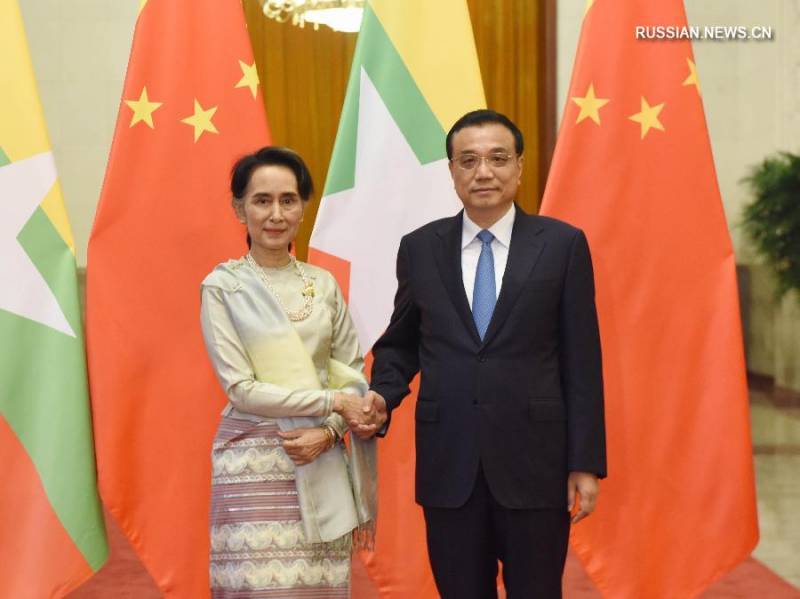
Information